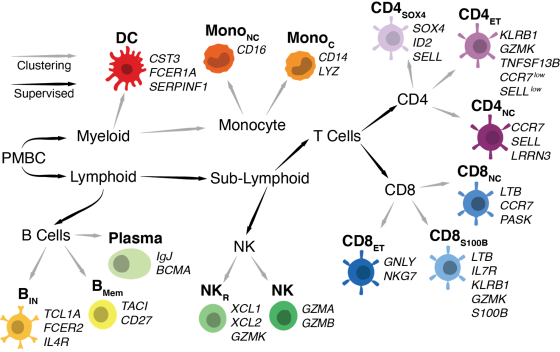Onek1K
Onek1K is a pioneering research program furthering our understanding of how individual cells response to disease and pathogens. The study links genetics and immunology to determine why some individuals respond to treatment but others do not, for diseases such as multiple sclerosis, rheumatoid arthritis, inflammatory bowel disease (Crohn’s disease and ulcerative colitis) and Type 1 diabetes.
For Researchers
The OneK1K cohort consists of single-cell RNA sequencing (scRNA-seq) data from 1.27 million peripheral blood mononuclear cells (PMBCs) collected from 982 donors. You can freely download and search the data, and we encourage the use and to publish results generated from these data. There are absolutely no restrictions or embargoes on the publication of results derived from OneK1K data or summary statistics.
However, we encourage you to contact us before embarking on large-scale analyses to check if your proposed analysis overlaps with work currently underway by the OneK1K team. All users of OneK1K data agree to not attempt to re-identify participants. Contact Us
For the Public
Our immune system is complex and varies greatly between individuals. At present researchers don’t completely understand why some medical treatments work well in some patients and not in others. This study will link specific genes and immune cell types to an individual’s disease state.
We do this by analysing blood samples using single cell sequencing. This new technology allows us to detect subtle changes in individual cells. We can then identify specific genes and pathways that contribute to disease development and progression. This information can then be used to develop targeted personalised treatments tailored to an individual’s specific immune profile. This approach has the potential to revolutionise medicine by providing more effective and efficient treatments for a range of complex and debilitating diseases.
For Industry
Contact us to find out how this program can help to derisk your drug discovery pathway. We have developed a framework for the classification of individual cells, and by combining scRNA-seq data with genotyping, we have identified 8 cell types of interest and mapped their phenotypic association. This data can be used to understand how specific cell types will react to specific drugs, enabling a precision medicine approach to drug design and prescribing patterns. Contact Us
Our free access database consists of single-cell RNA sequencing (SCRNA-seq) data from 1.27 million peripheral blood monocuclear cells (PMBCs).
Please consider chatting to us if you are analysing large data sequences and also citing us in your publication.
We request that any use of data obtained from the OneK1K browser cites the OneK1K flagship paper:
- Yazar S., Alquicira-Hernández J., Wing K., Senabouth A., Gordon G., Andersen S., Lu Q., Rowson A., Taylor T., Clarke L., Maccora L., Chen C., Cook A., Ye J., Fairfax K., Hewitt A., Powell J. Single cell eQTL mapping identified cell type specific control of autoimmune disease. Science, 376, 6589 (2022)
and, that any online resources that include the data set provide a link to the original Onek1k browser.
For more information please refer to our Terms and Conditions of Use and Citation in Publications page. Terms
What are the applications for this research?
The data from the OneK1K research provides a new pathway to narrowing down potential drug targets. The greatest insight from this work will be the identification of therapeutic targets and defining sub-populations of immune disease which can then refine clinical trials to assess drug effectiveness.
By linking treatment back to an individuals immune genetics we will be able to screen patients prior to administering treatment and prioritise new drug targets for specific cell types in individual patients. In short, precision medicine.
